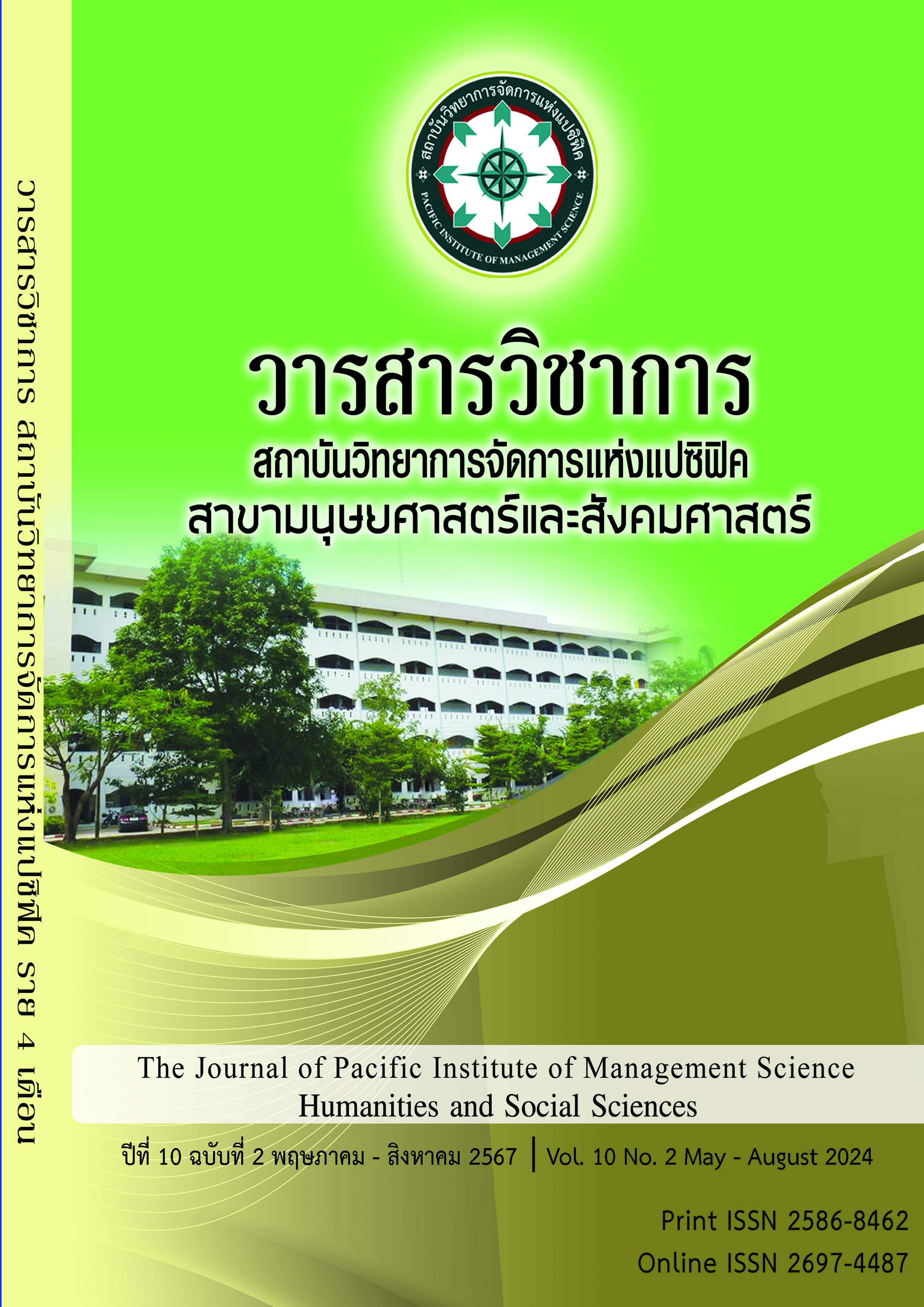Factors affecting knowledge and attitude in the use of Artificial intelligence (AI) in Accounting of Accounting student (regular semester) Valaya Alongkorn Rajabhat University under royal patronage
Keywords:
Knowledge, Attitude, Artificial Intelligence, AccountingAbstract
Nowadays, life has been led by technology to help work faster. The accounting profession is the same. Artificial intelligence (AI) technology has been used to add value to operations. It helps humans think, which will focus on data processing and analysis. The objective is to study the factors affecting the knowledge and attitudes of accounting students about the use of artificial intelligence (AI) in accounting. And to be a guideline for developing and promoting students to have better knowledge, understanding, skills, and characteristics. The quantitative research model was used. The sample group used in this research was 64 undergraduate students in the field of accounting.
The research results found that the factors affecting the knowledge and attitudes of accounting students about the use of artificial intelligence (AI) in accounting work of accounting students are in 2 aspects: knowledge and attitude. The factor with the highest average value is the attitude towards the use of artificial intelligence (AI) in accounting work at a moderate level. Most students are first-year students who lack experience in using artificial intelligence in accounting work. The results of this study are useful for improving the curriculum to be up-to-date and in line with the needs of the labor market. Knowledge of digital accounting, accounting programs used in modern organizations, increasing knowledge of accounting-related technologies, using computer accounting programs, data analysis software and cloud systems, encouraging students to participate in online courses, seminars and self-learning. Students will have knowledge, attitudes and characteristics appropriate for the accounting field.
References
กชทีปต์ พิชิตวิทยาเอก. (2566). ทัศนคติของพนักงานในระดับปฏิบัติงานของการประปานครหลวง
ที่มีต่อระบบปัญญาประดิษฐ์ (AI) เพื่อประยุกต์ใช้ในการทำงาน.
แก้วใจ ดวงมณี และชนิดา ยาระณะ. (2563). ความตระหนักและการเตรียมความพร้อมการจัดการ
เรียนการสอน เพื่อเป็นนักบัญชีที่มีทักษะเหนือกว่าปัญญาประดิษฐ์ : กรณีศึกษาผู้สอนและผู้เรียนแผนกวิชาการบัญชี ในสถาบันการอาชีวศึกษาภาคเหนือ. วารสารวิจัยและนวัตกรรมการอาชีวศึกษา. 4 (2), 91 – 104.
ณัฐรดา เหมือนเดช. (2566). ปัจจัยที่มีผลต่อการนำเทคโนโลยี AI มาประยุกต์ใช้ในงานด้านบัญชี
ของนักบัญชีในกรุงเทพมหานคร: กรณีศึกษา ChatGPT. (บริหารธุรกิจมหาบัณฑิต
โครงการหลักสูตรปริญญาโทออนไลน์). กรุงเทพ : มหาวิทยาลัยธรรมศาสตร์.
ไตรรัตน์ ธนะประกอบกรณ์. (2563). ปัจจัยที่มีความสัมพันธ์ต่อผลกระทบของปัญญาประดิษฐ์ใน
การให้บริการทางด้านการเงินของธนาคารพาณิชย์ไทย กรณีศึกษาเขตกรุงเทพมหานคร
และปริมณฑล. วารสารบริหารธุรกิจเทคโนโลยีมหานคร. 17 (1), 54 – 71.
ปนพรรษ์ นุทกาญจนกุล. (2560). ผลกระทบและการเตรียมความพร้อมของนักบัญชีไทยต่อ
ปัญญาประดิษฐ์ (AI). (บัญชีมหาบัณฑิต). กรุงเทพ : มหาวิทยาลัยธรรมศาสตร์.
ประสุตา นาดี และคณะ. (2564). สมรรถนะของนักบัญชีในยุคดิจิทัล: ทักษะการปรับตัวในโลกที่
เปลี่ยนแปลง. วารสารศิลปศาสตร์และวิทยาการจัดการ. 8 (2), 19 – 32.
วราพร นาคประทุม และ ดั้นดุสิต โปราณานนท์. (2564). ความรู้ ความเข้าใจ และทัศนคติที่มีผล
ต่อความพร้อมในการนำเทคโนโลยีปัญญาประดิษฐ์ (AI) มาใช้ในการบริหารโครงการ.
วารสารบริหารธุรกิจเทคโนโลยีมหานคร. 18 (2), 1 – 25.
ศรีสุดา อินทมาศ. (2563). โอกาสข้ามผ่านกรอบความคิดเดิมสู่โลกใหม่สายอาชีพนักบัญชียุค
ดิจิทัล สืบค้นเมื่อ 1 มิถุนายน 2567 จาก
https://www.tfac.or.th/en/Article/Detail/126279
สำนักส่งเสริมวิชาการและงานทะเบียน. (2567). สืบค้นเมื่อ 25 มิถุนายน 2567 จาก
http://acad.vru.ac.th/acad/about_acad/FTES/2566/std_chart_nm_66_06.pdf
อโนทัย พลภาณุมาศ. (2565). การศึกษาทักษะทางวิชาชีพบัญชีในการเป็นนักบัญชียุคดิจิทัล :
กรณีศึกษานักศึกษาระดับปริญญาตรีสาขาการบัญชี คณะบริหารธุรกิจและศิลปศาสตร์.
วารสารบริหารธุรกิจอุตสาหกรรม. 4 (2), 20 – 31.
อภิสรา คชรัชแก้วฟ้า. (2566). การศึกษาผลกระทบจากการยอมรับใช้งานเทคโนโลยี
ปัญญาประดิษฐ์ (AI). (ปริญญาการจัดการมหาบัณฑิต). กรุงเทพ :
มหาวิทยาลัยธรรมศาสตร์.
Brynjolfsson, E., & McAfee, A. (2014). The second machine age: Work, progress, and
prosperity in a time of brilliant technologies. W. W. Norton & Company.
Kaplan, A., & Haenlein, M. (2019). Siri, Siri, in my hand: Who’s the fairest in the land?
On the interpretations, illustrations, and implications of artificial intelligence.
Business Horizons, 62(1), 15-25.
Downloads
Published
Issue
Section
License
Copyright (c) 2024 Pacific Institute of Management Science

This work is licensed under a Creative Commons Attribution-NonCommercial-NoDerivatives 4.0 International License.
บทความที่ได้รับการตีพิมพ์เป็นลิขสิทธิ์ของ สถาบันวิทยาการจัดการแห่งแปซิฟิค
ข้อความที่ปรากฏในบทความแต่ละเรื่องในวารสารวิชาการเล่มนี้เป็นความคิดเห็นส่วนตัวของผู้เขียนแต่ละท่านไม่เกี่ยวข้องกับสถาบันวิทยาการจัดการแห่งแปซิฟิค และคณาจารย์ท่านอื่นๆในสถาบันฯ แต่อย่างใด ความรับผิดชอบองค์ประกอบทั้งหมดของบทความแต่ละเรื่องเป็นของผู้เขียนแต่ละท่าน หากมีความผิดพลาดใดๆ ผู้เขียนแต่ละท่านจะรับผิดชอบบทความของตนเองแต่ผู้เดียว







